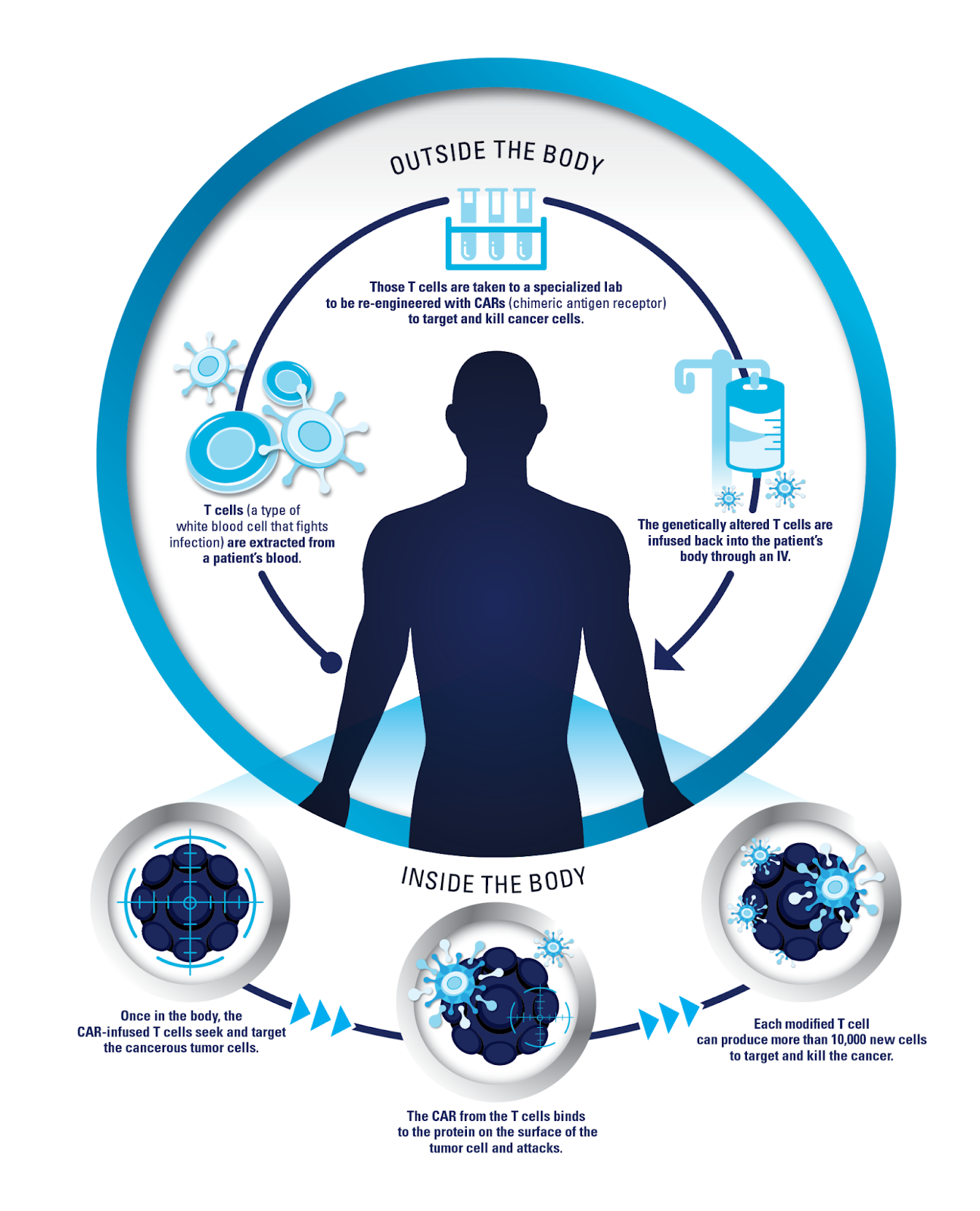The Transformative Potential of CAR-T Cells in the Future of Healthcare
What are CAR-T Cells?
CAR-T cells, or Chimeric Antigen Receptor T-cells, are a type of immunotherapy used to treat certain cancers. These cells are created by genetically modifying a patient’s T cells—a type of white blood cell integral to the immune system—to better recognize and attack cancer cells. Normally, T cells help fight infections but often struggle to identify and eliminate cancer cells. By engineering these cells with chimeric antigen receptors (CARs), CAR-T therapy enhances the T cells’ ability to specifically target proteins on the surface of cancer cells, allowing for more effective destruction of these malignant cells.
How CAR-T Therapy Works
CAR-T therapy involves extracting a patient’s T cells and modifying them in a laboratory to express CARs on their surface. These CARs are specifically designed to recognize and bind to antigens present on cancer cells. Once the T cells are modified, they are re-infused into the patient, where they seek out and destroy the cancer cells. This therapy has already demonstrated significant success in treating blood cancers such as leukemia and lymphoma and is considered a major breakthrough in cancer treatment.
The Future of CAR-T Therapy and Applications
The impact of CAR-T cells on healthcare is expanding rapidly. Initially successful in treating certain blood cancers, CAR-T therapies are now advancing in clinical trials to target solid tumors and autoimmune diseases. With continuous advancements in gene editing, including CRISPR technology, and improvements in manufacturing processes, CAR-T cell therapy is becoming more accessible and personalized.
As the field progresses, CAR-T cells are expected to revolutionize cancer treatment and personalized medicine. Key areas of future impact include:
Targeting Blood Cancers: CAR-T cell therapies have shown high efficacy in treating blood cancers such as leukemia and lymphoma. These therapies can be customized to target specific antigens on cancer cells, making them a powerful tool in eradicating tumors.
CRISPR Innovations: Incorporating CRISPR/Cas9 technology allows for more precise gene editing in CAR-T cells, reducing T cell exhaustion and enhancing their ability to fight tumors. This innovation also minimizes the risk of side effects and improves the overall success rate of treatments.
Expanding to Solid Tumors: CAR-T cells hold potential beyond blood cancers. Researchers are working to expand their use to target solid tumors and other non-cancerous diseases, by modifying CAR-T cells to recognize and attack cellular markers associated with a variety of conditions.
Manufacturing and Scalability: One of the challenges for CAR-T therapy is scaling production to make treatments more accessible and affordable. Advances in manufacturing processes, such as viral vector production a nd semi-automated systems for T cell modification, are helping to address this challenge.
CAR-T therapy is poised to be a transformative technology in the future of healthcare, with potential applications that extend far beyond oncology.
Market Outlook
The CAR T-cell therapy market has experienced substantial growth and is expected to continue its expansion in the coming years. In 2024, the market was valued at approximately USD 4.6 billion, with projections indicating it could reach USD 25 billion by 2035, reflecting a compound annual growth rate (CAGR) of around 16.6%. This growth is fueled by rising cancer incidences, particularly leukemia and lymphoma, ongoing advancements in CAR T-cell technology, and the approval of new therapies across a broader range of cancers.
Healthcare Applications
The potential of CAR-T cells for innovation have unlocked numerous healthcare applications, spanning research, personalized medicine, treatments. Here are some rapidly developing applications:
Blood Cancer: CAR-T cell therapy has proven highly effective in treating hematological cancers, particularly for patients with certain types of leukemia and lymphoma that have not responded to traditional treatments. Companies like Novartis and Gilead/Kite Pharma have developed treatment options like Kymriah and Yescarta to support such treatments.
Solid Tumors: While more challenging, researchers are working on adapting CAR-T therapies to target solid tumors such as breast, lung, and pancreatic cancers. These advancements involve engineering CAR-T cells to overcome the tumor microenvironment, which often protects solid tumors from immune attacks. Adaptimmune, Poseida Therapeutics, and CARsgen Therapeutics are just a few companies looking to expand the use of CAR-T therapies for solid tumors.
Autoimmune Diseases: CAR-T therapies are being investigated for autoimmune disorders like lupus and rheumatoid arthritis, where they could potentially reprogram the immune system to prevent attacks on the body’s own cells. Companies like Kyverna Therapeutics and Sangamo Therapeutics are looking to expand on this untapped potential to support research and treatments for autoimmune diseases.
Neurological Disorders: Emerging research is investigating the potential of CAR-T cells in treating certain neurological conditions, such as glioblastoma (a type of brain cancer) and neurodegenerative diseases. Companies working in this space aiming to grow the use of CAR-T cell therapy options for neurological disorders include Mustang Bio.

——————————
If you are a builder, investor or researcher in the space, I would love to have a chat – please reach out to us at ayla.j@thelotuscapital.com or amit.k@thelotuscapital.com


